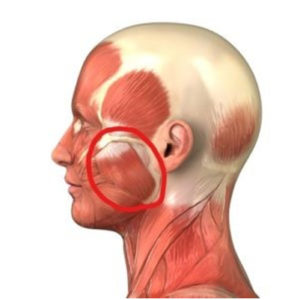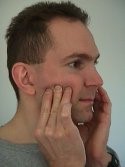A TMJ Story That Has A Happy Ending
Author: Julie Donnelly, LMT –The Pain Relief Expert
Editor: Dr. Steve Chaney
Summer And The Living Is Easy
 As the song goes: ”…Summertime and the living is e-a-s-y….” Here in Florida, we know that the living is easy because it’s so hot who wants to be doing anything except either sitting in the shade, or inside in the air conditioning. Personally, I don’t think this summer was so bad, especially the evenings, but then, I really hate the cold so maybe my opinion is biased.
As the song goes: ”…Summertime and the living is e-a-s-y….” Here in Florida, we know that the living is easy because it’s so hot who wants to be doing anything except either sitting in the shade, or inside in the air conditioning. Personally, I don’t think this summer was so bad, especially the evenings, but then, I really hate the cold so maybe my opinion is biased.
To stay in alignment with “living is easy,” I’m taking the advice of a few experts who teach easy ways to stay calm, motivated, and happy. I’m taking a 30-day break from the news. It’s so much in my face lately that it’s really affecting me in a very negative way. I am going on a “news fast” for 30 days. Absolutely no negative news of any kind for a full month. I’m surrounded by news all day so it’s a challenge, but I’ve found a great substitute: www.GoodNewsNetwork.org. Their mission is to be an antidote to the barrage of negativity experienced in the mainstream media.
This month I had several requests to explain how muscles can be a primary cause of TMJ. The initials “TMJ” stand for Temporal Mandibular Joint. Basically, it’s the hinge that enables you to open your mouth and chew. The problem is when it is pulled out of alignment you have jaw pain. You may also have some painful clicking in the area that is behind your last molars, the location of the joint.
A TMJ Story That Has A Happy Ending
 About 15 years ago I was seeing clients in my office, which was located in Dr. Zev Cohen’s medical office. Frequently Dr. Cohen would ask me to look at one of his patients because he felt their problem was muscular, and each time it was being caused by tight muscles. He liked the results we were achieving, and I was happy to be a valuable part of his Internal Medicine team.
About 15 years ago I was seeing clients in my office, which was located in Dr. Zev Cohen’s medical office. Frequently Dr. Cohen would ask me to look at one of his patients because he felt their problem was muscular, and each time it was being caused by tight muscles. He liked the results we were achieving, and I was happy to be a valuable part of his Internal Medicine team.
On day a young woman, around 32 YO, came in on a Sunday because she had forgotten to have her own doctor fill in a form she needed in order to have surgery performed the next day. Dr. Cohen was open on Sundays (closed on Saturday) so she came to get surgical clearance. I just happened to be there doing some work in my office, but not to see clients.
Dr. Cohen asked the woman why she needed surgery and she explained that her jaw was locked tight, and the Oral surgeon was going to sever the masseter muscle. That simple-sounding surgery has a serious side-effect….you can’t close your mouth! She would have walked around with her mouth hanging open for the rest of her life! Plus, when your mouth is open, you drool. That would have been her life if she hadn’t forgotten to get that form signed!
When Dr. Cohen looked at her masseter muscle, he found it felt like she had stuffed her cheeks with nuts. There were so many spasms that it was locking her back teeth together and she couldn’t open her mouth. She didn’t need surgery, she needed to untie the knots in her masseter muscle.
Since I was there, Dr. Cohen had me work on this muscle, and then as always, I showed her how to do it. It took only about 15 painful minutes to release all the spasms. When I was finished, I had her sit up and I showed her what to do. At the very end I had her pressing on both sides of her jaw, and slowly open her mouth. She was shocked to see that she could do it.
Then I had her take her hands away and just open her mouth. We both started to cry when she opened her mouth all the way without any pain. She was saved from a surgery that would have had a lifetime of drooling and dryness.
I don’t know why her doctor, or the oral surgeon didn’t know to tell her to do this, but it’s something I try to share with as many people as possible. I hope you will pass this newsletter along since you may save someone from the same potential surgery.
The Masseter Muscle
 The masseter muscle (circled in red) connects your cheekbone to your jawbone. When it contracts you chew your food or clench your teeth.
The masseter muscle (circled in red) connects your cheekbone to your jawbone. When it contracts you chew your food or clench your teeth.
If you put your flat fingers (fingerprints) on your cheeks and then clench, you will feel your masseter contract.
If you chew gum or clench your teeth frequently the muscle contracts and then shortens. The problem is, when it is shortened and you try to open your mouth to yawn or put food into your mouth, the muscle won’t lengthen to allow them movement.
If one side is tighter than the other side, your jaw will pull toward the tight side, “click” and hurt when you try to open your mouth. This is the common symptom of TMJ. If both sides are shortened, you won’t be able to open your mouth fully. This is what was happening to the woman I mentioned above.
Relief From Jaw Pain
 Press your three fingers into the masseter muscle on both sides of your jaw, but only use pressure on one side.
Press your three fingers into the masseter muscle on both sides of your jaw, but only use pressure on one side.
Press as deeply as you can tolerate and hold the pressure for 5-10 seconds. Lighten up the pressure on that side and repeat on the opposite side.
Do this alternating press/release all over the muscle. Continue alternating, and eventually moving along the entire length of the muscle until you have covered it from your cheek bone to your jawbone.
Finally, press both sides at the same time and slowly open your mouth as wide as possible. Slowly close your mouth, and then repeat this stretch 3-4 times.
Do this as often as needed to get total relief. Since this problem happens because of a repetitive movement, it may return. Just do the treatment before it becomes a problem, and the situation will be eased.
Wishing you well,
Julie Donnelly
These statements have not been evaluated by the Food and Drug Administration. This information is not intended to diagnose, treat, cure, or prevent any disease.
